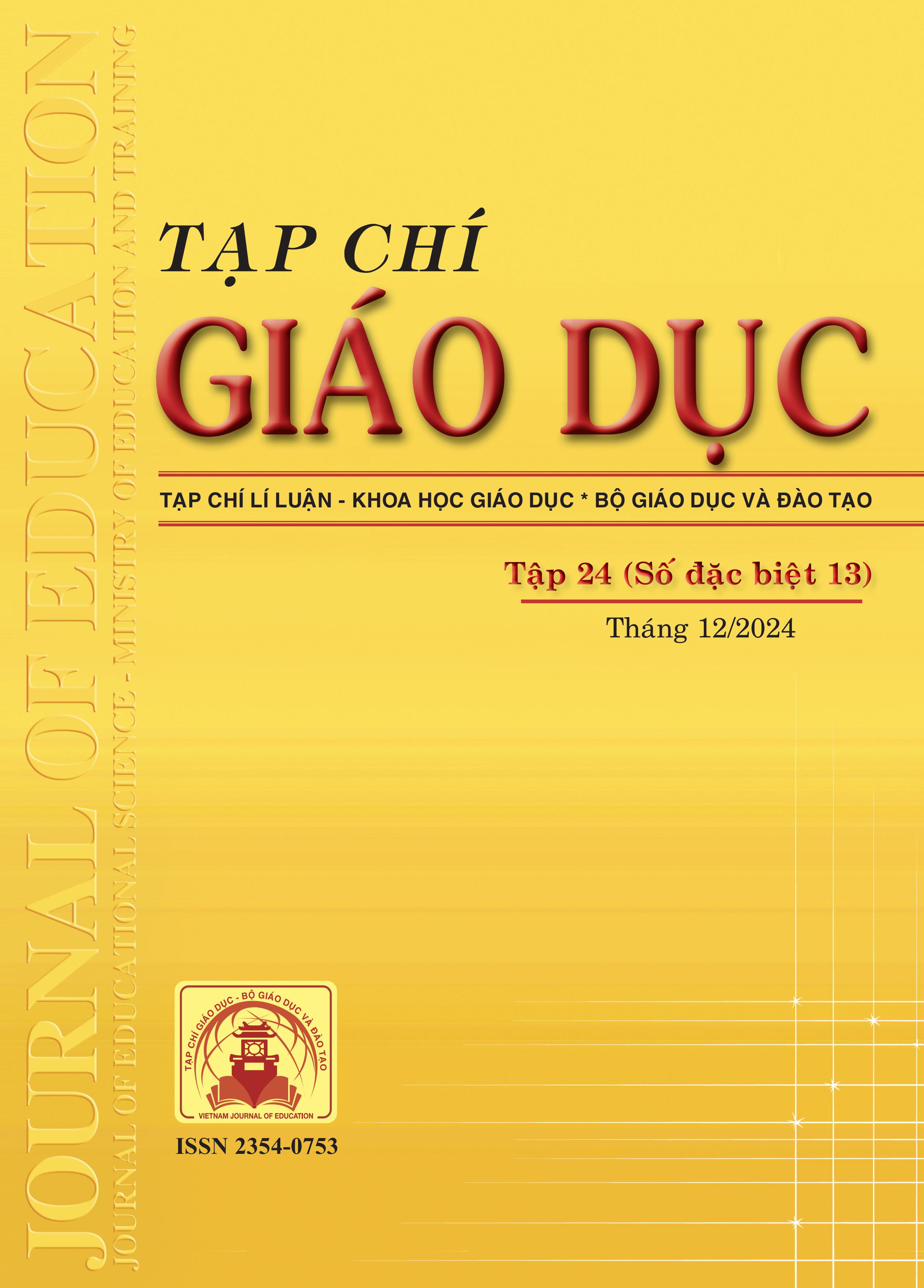Mối quan hệ của năng lực số, sẵn sàng học tập tự định hướng và kết quả học tập của học sinh trung học phổ thông
Tóm tắt
In the context of digital transformation and the increasing demand for technology skills, digital competence and self-directed learning have become important factors in secondary education. However, the gap in digital skills and self-directed learning readiness among students poses a major challenge. This study aimed to determine the relationship between digital competence, self-directed learning readiness and learning outcomes of high school students. The study conducted a random survey of 865 students from 13 provinces and cities nationwide. The analysis results showed that students' digital competence was assessed at an average to high level, but a significant proportion of students were not confident with advanced digital skills, especially the ability to create digital content and operate complex technology equipment. The research results also identified that the status of self-directed learning readiness was still uneven among student groups. Research has confirmed the relationship between digital literacy, readiness for self-directed learning, and learning outcomes.
Tài liệu tham khảo
Adeyemon, E. (2009). Integrating Digital Literacies into Outreach Services for Underserved Youth Populations. The Reference Librarian, 50(1), 85-98. https://doi.org/10.1080/02763870802546423
Biggs, J. (2020). Teaching for Quality Learning at University: What the Student Does. Society for Research into Higher Education & Open University Press.
Carmen, P., Ungurean, B., Zamfir, C., Khamraeva, Z., & Daniel, A. (2023). The Impact of Technology on Improving the Learning Process in Physical Education Lessons for Medically-Exempt Pupils. Balneo and PRM Research Journal, 14. https://doi.org/10.12680/balneo.2023.551
Carretero, S., Vuorikari, R., & Punie, Y. (2017). DigComp 2.1: The Digital Competence Framework for Citizens with eight proficiency levels and examples of use. https://doi.org/10.2760/38842
Chauhan, S. (2017). A meta-analysis of the impact of technology on learning effectiveness of elementary students. Computers & Education, 105, 14-30. https://doi.org/10.1016/J.COMPEDU.2016.11.005
Dang Thi Thanh Thuy, Le Thai Hung, Vu Phuong Lien (2024). Self-Directed Learning Readiness Among Undergraduate Students. (2024). Journal of Educational and Social Research, 14(5), 233. https://doi.org/ 10.36941/jesr-2024-0135
Fisher, M. J., & King, J. (2010). The self-directed learning readiness scale for nursing education revisited: A confirmatory factor analysis. Nurse Education Today, 30(1), 44-48. https://doi.org/10.1016/J.NEDT.2009.05.020
Fisher, M., King, J., & Tague, G. (2001). Development of a self-directed learning readiness scale for nursing education. Nurse Education Today, 21(7), 516-525.
Geng, S., Law, K. M. Y., & Niu, B. (2019). Investigating self-directed learning and technology readiness in blending learning environment. International Journal of Educational Technology in Higher Education, 16(1), 17. https://doi.org/10.1186/s41239-019-0147-0
Guglielmino, L. M. (1977). Development of the self-directed learning readiness scale [Doctoral Dissertation, University of Georgia]. Georgia.
Hanh, N. , Lam, L. , & Hung, L. T. (2023). Design Tools to Self Assess Digital Competency of Secondary School Students. VNU Journal Of Science: Education Research, 39(3), 71-80. https://doi.org/10.25073/2588-1159/vnuer.4790
Karatas, K., & Arpaci, I. (2021). The role of self-directed learning, metacognition, and 21st century skills predicting the readiness for online learning. Contemporary Educational Technology, 13(3), 1-13. https://doi.org/10.30935/ cedtech/10786.
Krumsvik, R. J. (2008). Situated learning and teachers’ digital competence. Education and Information Technologies, 13(4), 279-290. https://doi.org/10.1007/s10639-008-9069-5
Lê Anh Vinh, Bùi Diệu Quỳnh, Đỗ Đức Lân, Đào Thái Lai, Tạ Ngọc Trí (2021). Xây dựng khung năng lực số cho học sinh phổ thông Việt Nam. Tạp chí Khoa học Giáo dục Việt Nam, số đặc biệt 1, 10-20.
Lê Thái Hưng, Nguyễn Thị Hạnh, Vũ Phương Liên (2023). Nghiên cứu và đề xuất khung năng lực số của học sinh trung học cơ sở trong học tập trực tuyến. Tạp chí Giáo dục, 22(19), 19-24.
Robertsone, G., & Lapiņa, I. (2022). Digital Transformation in Higher Education: Drivers, Success Factors, Benefits and Challenges. https://doi.org/10.22364/htqe.2022.11
Tillema, H. H. (2000). Belief change towards self-directed learning in student teachers: Immersion in practice or reflection on action. Teaching and Teacher Education, 16(5), 575-591. https://doi.org/10.1016/S0742-051X(00)00016-0
Trần Đức Hoà, Đỗ Văn Hùng (2021). Khung năng lực số của sinh viên Việt Nam trong bối cảnh chuyển đổi số. Tạp chí Thông tin và Tư liệu, 1, 12-21.
UNESCO (2018). A Global Framework of Reference on Digital Literacy. In UNESCO Institute for Statistics.
Đã Xuất bản
Cách trích dẫn
Số
Chuyên mục
Giấy phép

Tác phẩm này được cấp phép theo Ghi nhận tác giả của Creative Commons Giấy phép quốc tế 4.0 .












